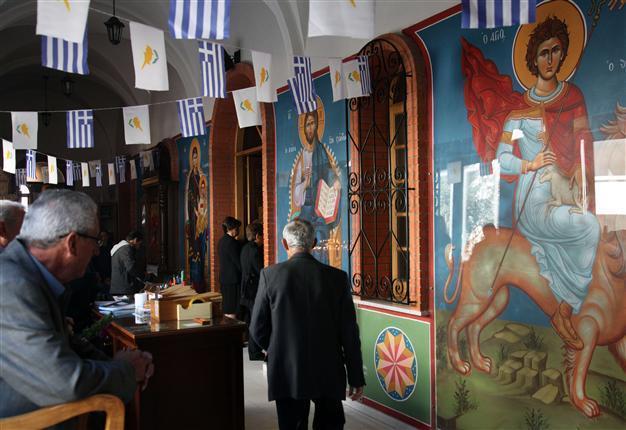Greek Cypriots show faith in church to save island
NICOSIA- Agence France-Presse

Greek and Cypriot flags decorate Saint-Mamas Orthodox church as Cypriots attend Sunday service in the capital Nicosia on March 24. AFP Photo
Greek Cypriots flocked to Sunday mass hoping the island's powerful Orthodox Church, with assets worth hundreds of millions of euros, can help pull it out of its worst economic crisis in decades.
"If they want to, the church can save Cyprus," said Panos, a worshipper at a church in Nicosia, emphasising its "economic power."
The head of the church, Archbishop Chrysostomos II, has offered to help bail Greek Cyprus out of its financial crisis by putting the institution's assets at the government's disposal.
"The entire property of the church is at the disposal of this country to prevent the economy from collapsing," the archbishop said after meeting President Nicos Anastasiades on March 19.
The Greek Cypriot government has to raise 5.8 billion euros ($8 billion) to unlock an EU bailout package of 10 billion euros or face bankruptcy.
"Our hope is with God and no one else. We have all been hurt, but for our country we will offer whatever we can," said Elpiniki Loizou on the steps of the Church of Saint Mamas on the outskirts of the capital.
"We are not Christians in the sense that we expect God to save us. ... But the church can help, by contributing financially and through religious politics, by lobbying other churches," said Georges Nicolaides.
"It's time they hand back the property gradually to the people," he said, pointing out that the institution was wealthy "because under the Ottomans, the church was in charge of collecting taxes" and inherited vast amounts of land.
Although the exact value of the church's assets is unknown, in mid-March Archbishop Chrysostomos was quoted by local media as saying it could be worth hundreds of millions of euros.
The Orthodox Church is the biggest landowner on the island, and it has investments in hotels and leading companies such as the Hellenic Bank in which it is a major shareholder with a 30 percent stake.
It also holds a 20 percent stake in the Keo beer brewing company which also sells wine and water.
In September, faced with the crisis, the church cut salaries of bishops and priests by 15 to 25 percent but spared those who received 1,500 euros or less in monthly salaries, considered low by the institution.
"The archbishop is a businessman," said Costas Michail. He "works for his own personal interest and for the church, not for the people."
Chrysostomos has always defended the island's banks, drawing criticism from Greek Cypriot authorities as well as the international community.
In January, the then-president, communist Demetris Christofias, said "the primate of the church cannot be excluded from this group of entrepreneurs and bankers" held responsible for the Greek Cyprus crisis.
But this did not stop Christofias from using the archbishop to mediate with Moscow with whom he was negotiating a loan to avoid relying on the European solidarity mechanism.
In an interview with the Greek daily Realnews published on March 23, the archbishop said he favored the debt-ridden island nation leaving the euro.
"The euro cannot last," said Chrysostomos. "I'm not saying that it will crumble tomorrow, but with the brains that they have in Brussels, it is certain that it will not last in the long term, and the best is to think about how to escape it." The island's archbishop historically was the leader of the Greek Cypriot community during the three centuries of Ottoman rule and has long played a major political role. Even now he is consulted on major decisions.
The late Archbishop Makarios III, considered the founding father of the Republic of Greek Cyprus, was president from the time of its independence from Britain in 1960 right up until his death in 1977.
